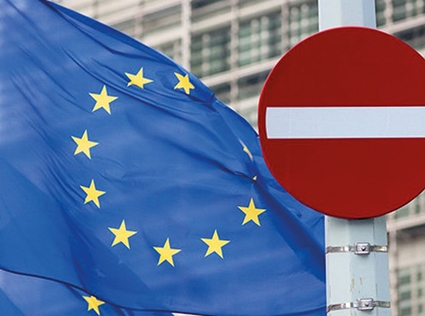Does Georgia Face Suspension of Visa-Free Regime?
Since the visa-free regime took effect for Georgia with the European Union in March 2017, certain EU member states have expressed concerns that Georgian citizens are misusing it, with France, Austria, Germany and Sweden in particular stressing an increased number of asylum seekers from Georgia, even after it was placed by several states on the list of safe countries.
Georgia’s Institute of Politics (GIP) says while regular meetings do take place between Georgian and European interior ministers to discuss and coordinate their responses to this issue, speculation abounds about the possibility that the visa suspension mechanism will be used against Georgia, an action which would have major consequences for the country.
GIP asked experts from Germany, Belgium, The Netherlands, and Georgia to comment on the likelihood that the EU would activate the visa suspension mechanism against Georgia, focusing on these two questions: 1. Does the abuse of visa-free travel by Georgian citizens represent ‘an emergency situation’? 2. How likely is it that the visa suspension mechanism will be introduced against Georgia?
Alexandra Stiglmayer, Senior Analyst and Secretary-General of the European Stability Initiative, an independent think-tank that has worked on EU visa liberalization since 2008, does not believe the EU will suspend visa-free travel with Georgia.
“First, it would have a huge negative impact on EU-Georgia relations. Second, deep down, member states know that they themselves can reduce the number of unfounded asylum claims,’ she said.
The expert believes the reason this question is even on the table is the rise in asylum claims by Georgians from 11,100 in 2017 to 19,300 in 2018. At the same time, only 5% of the applicants received protection in the EU in 2018.
“Getting to suspension is not easy. It requires the agreement of the European Commission and a majority of all member states, following an examination of various factors such as the number of affected member states, not many in Georgia’s case, and the overall impact on the migratory situation in the EU, which is limited,” she told GIP.
However, she says it is important that Georgia continues to cooperate with EU member states, in particular in the readmission process, and does what it can to reduce the number of Georgian asylum applicants.
“This is not much: information campaigns, checks at the border, some penalties. It shows the EU that Georgia is taking the problem seriously. The rest is up to EU member states,” she added.
Rikard Jozwaik, journalist of Radio Free Europe/Radio Liberty in Brussels, says there is a high risk that Georgia will lose its visa liberalization status, but says there are no guarantees either.
“Since we are talking politics, it is worth keeping in mind what sort of winds are blowing in large parts of the European Union at the moment. These are the winds of closed borders, consolidation and introspection,” he said.
Jozwaik says a small number of Georgian criminal gangs active in some EU member states do not yet pose an increased risk to the security of member states, “hence the suspension mechanism could not, at this point, be invoked on these grounds.”
Jelger Groeneveld, Dutch Liberal party D66, Board Member International Cooperation Division, says in their visa waiver feedback report ‘Second Report under the Visa Suspension Mechanism,’ that the European Commission concludes Georgia has followed up on recommendations stipulated in the first report, and made progress on other migration-related policies and action plans, adding Georgia has recently signed an agreement with the EU’s EuroJust agency, aimed at fighting cross-border crime.
“However, the report identifies the persistent high influx of unfounded asylum applicants in various member states which requires immediate action,” Groeneveld said.
He noted the levels of abuse of the visa waiver does not represent an ‘emergency situation’ for EU member states yet, as defined in the suspension mechanism clauses.
“Most crucial, however, is that Georgia maintains full cooperation on the readmission of nationals, an important key point in the assessment to invoke the suspension mechanism. Currently, Georgia’s visa waiver to Schengen is not in immediate danger, mostly based on this high level of readmission and cooperation in crime-fighting efforts,” he said.
Commenting on the same issue, Open Society Georgia Foundation program Manager Vano Chkhikvadze says regarding the likelihood of invoking the visa suspension mechanism against Georgia, it is indeed difficult to make any predictions.
“If Georgia continues to meet the criteria necessary for invoking the suspension mechanism, and if the precedent is created whereby the European Union suspends visa-free travel with any country, then the likelihood that Georgia will be next increases,” he said.
In mid-May, European Commissioner for European Neighborhood Policy and Enlargement Negotiations, Johannes Hahn, said everything is going well with regards Georgia’s visa-free regime with the European Union.
During the 10th anniversary of the Eastern Partnership in Brussels, Hahn was asked about the possibility of activation of the suspension mechanism. He answered that “everything is fine.”
The visa-free regime with the EU took effect on March 28, 2017, meaning all Georgians holding biometric passports can enter the Schengen Area for 90 days within any 180-day period for vacation, business, or any other purpose except work.
Georgians are able to travel without visas to the following 22 EU member states: Belgium, Austria, Germany, Denmark, Spain, Estonia, Italy, Latvia, Lithuania, Luxembourg, Malta, the Netherlands, Poland, Portugal, Greece, France, Slovenia, Slovakia, Hungary, Finland, Sweden, and the Czech Republic.
Georgians can also travel without visas to four non-EU-member states (Iceland, Lichtenstein, Norway and Switzerland) as well as four Schengen candidate countries (Bulgaria, Cyprus, Romania and Croatia). Exceptions for visa-free travel include Ireland and the United Kingdom.
By Thea Morrison
Image source: GIP












